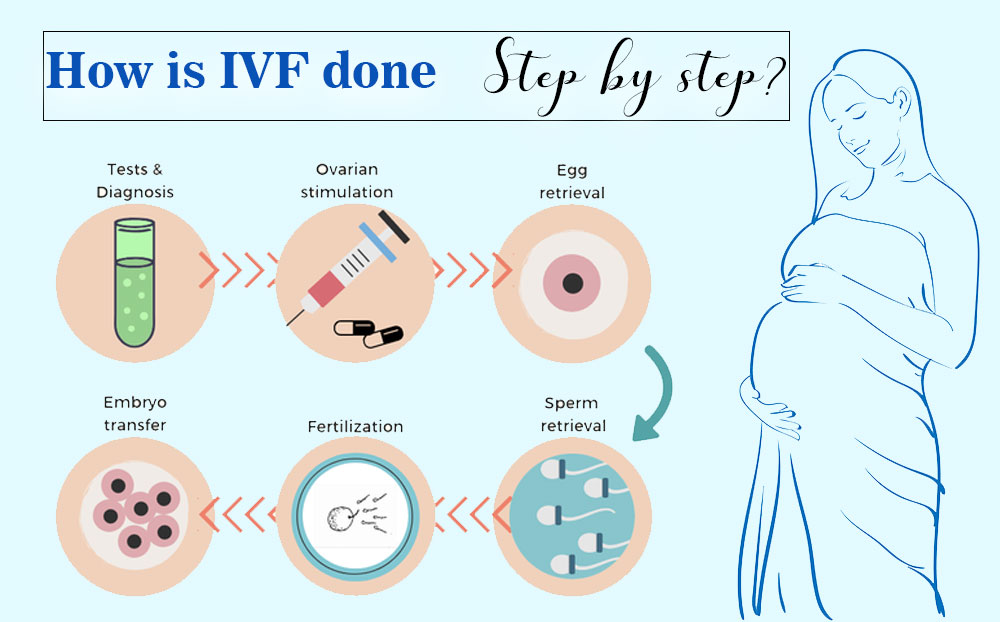When it comes to Family planning, reproductive health comes as a major point of concern for both men and women, and it’s never too early to start thinking about it. Although many aspects of reproductive health are beyond our control, there are a few areas in which we can make informed decisions to improve our chances of success.
While women face the brunt of this most of the time, men should be aware of how their health affects reproduction as well. So that we may move away from stigmatizing and blaming one gender for pregnancy outcomes, we need to emphasize that both women’s and men’s health are important.
Why is now the right time to consider this?
Let’s suppose you have approached for an IVF treatment in USA after failing to conceive in a natural manner. So, the first thing IVF treatment clinic in USA would suggest you is to undergo a list of diagnoses and tests.
Eventually, if you got diagnosed with a certain infertility issue, the fertility expert would recommend IVF treatment or other alternative options accordingly. Taking the same scenario, if your age is more than 35 years, your chance of succeeding would be slightly low in comparison to you being an adult woman. Apparently, the IVF treatment cost in USA will also shoot up in this case.
Unfortunately, time is a significant factor in the reproduction process, especially for women. Many doctors believe that the most common cause of female infertility is advanced age, because the number of accessible eggs, as well as the chromosomal normality of each egg, decreases drastically as a woman matures.

When a woman is a fetus, she has seven million eggs, one to two million when she is born, and less than 600,000 when she reaches puberty. By the age of 37, the number has dropped to 25,000. Men, on the other hand, produce new sperm every 64 days on average, so while their fertility declines, it does so later in life and less severely than a woman’s.
While we can’t turn back the hands of time, you and your partner can take proactive actions to boost your fertility. The New Year is an excellent time to consider those measures and make improving your reproductive health a goal for 2022.
Resolutions Women Can Make To Improve Their Fertility in 2022
A woman’s reproductive health is influenced by her lifestyle choices. Consider applying the following in 2022 to emphasize your reproductive health in the New Year.
Alcohol & Caffeine – moderation is the key
There has been a lot of debate over the effects of alcohol and caffeine on women’s reproductive health, but it’s apparent that moderation is the key. When attempting to conceive, you should avoid drinking excessive amounts of alcohol (more than one drink per day), as studies have shown that it increases your relative chance of infertility.
Caffeine usage at high levels (five or more cups of coffee or its equivalent per day) has also been linked to lower fertility. However, this does not imply that you must eliminate caffeine from your diet entirely. Moderate caffeine consumption before or throughout pregnancy—roughly one cup of coffee—has no known negative impacts on fertility or pregnancy outcomes.
Quit Smoking
There is no room for discussion when it comes to smoking. Don’t start smoking if you don’t already. If you currently smoke, now is the right time to quit. According to studies, smoking has a significant negative impact on fertility and is linked to an increased chance of miscarriage in both spontaneously conceived and assisted reproductive technologies such as in vitro fertilization pregnancies (IVF).
Don’t Smoke and Limit Your Alcohol Consumption
Heavy drinking can impair testosterone production, leading in impotence and decreased sperm production. Consume alcohol in moderation if you choose to do so. And, although it should go without saying, it’s time to quit. Men who smoke cigarettes are more likely to have poor sperm counts, in addition to all the other problems of smoking. If you need assistance quitting, ask your doctor for assistance.
Resolutions Men Can Make To Improve Their Fertility in 2022
Diet, lifestyle, medical issues, work exposures, and other factors all affect male reproductive health. Men can make a commitment this year to take better care of their reproductive systems in order to increase their chances of becoming pregnant, and this, like women, begins with good lifestyle choices.
Eat a healthier diet
Weight loss is a smart place to start for males, just like it is for women because excess weight can affect sperm production. Men who are overweight or obese are more likely to generate less sperm or no sperm at all. While the findings do not indicate that being overweight causes fertility problems, a low sperm count can make it more difficult for men to conceive.
Eating a healthy diet is important for male reproductive health, just like it is for so many other aspects of general health. To assist the kidneys flush out toxins in the body, eat plenty of antioxidant-rich fruits and vegetables and drink enough water.

Keep a Healthy Body Weight
Maintaining a healthy weight and BMI is vital when attempting to conceive, but perhaps not for the reasons you might assume. Females who either are overweight or obese have lower fertility rates. Obesity, defined as a body mass index (BMI) greater than 30, makes it more difficult to conceive, according to studies. Being underweight or skinny (BMI less than 19) can, on the other side, diminish a woman’s fertility.
Stress Reduction
Another crucial step is to reduce stress, as it can impair sexual function and interfere with the hormones needed to create sperm. Even modest exercise can help reduce stress and boost levels of strong antioxidant enzymes, which can protect sperm.
Don’t Smoke and Limit Your Alcohol Consumption
Heavy drinking can impair testosterone production, leading to impotence and decreased sperm production. Consume alcohol in moderation if you choose to do so. And, although it should go without saying, it’s time to quit. Men who smoke cigarettes are more likely to have poor sperm counts, in addition to all the other problems of smoking. If you need assistance quitting, ask your doctor for assistance.
 Hebrew
Hebrew Arabic
Arabic German
German




